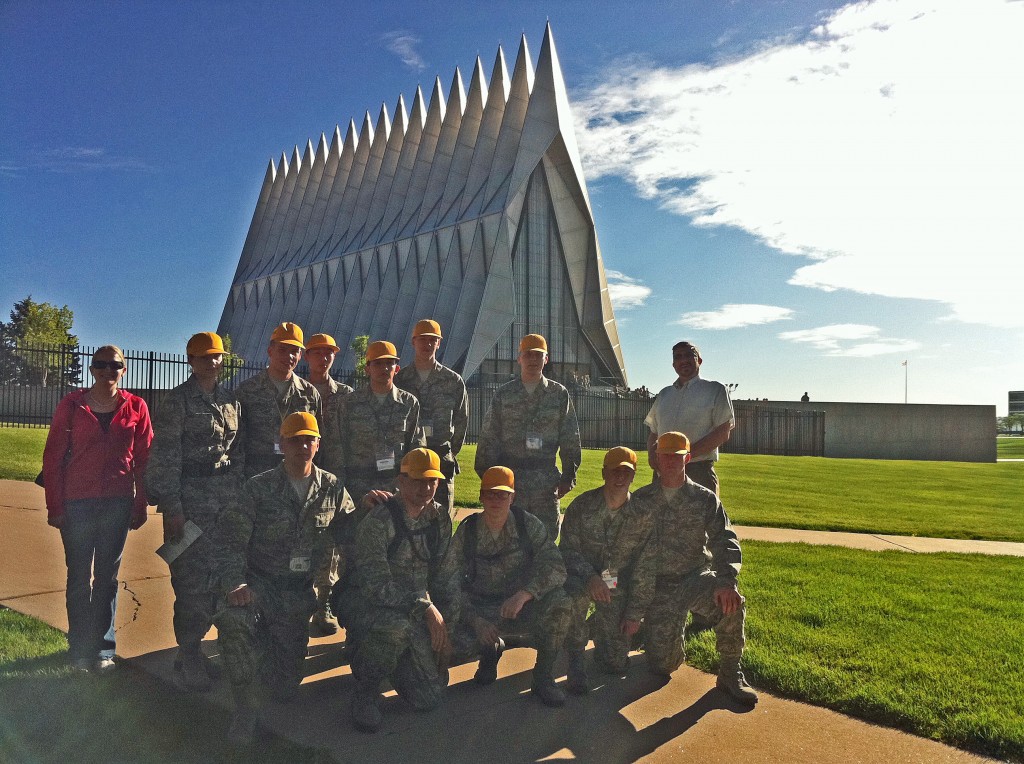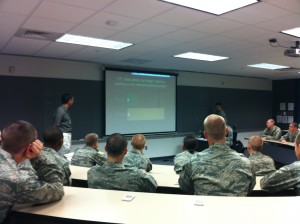Air Force Academy Makes Strides in Religious Respect
In a recent visit to USAFA, MAAF President Jason Torpy reviewed current training, programs, and materials. This is a continuation of ongoing collaboration between MAAF and USAFA to better provide for atheists, freethinkers, humanists, and other nontheists at the Academy. It is part of a larger effort to make the military culture more accepting of atheists in foxholes (and cockpits). The relationship began in earnest in November 2010 when USAFA invited the Military Association of Atheists & Freethinkers to sit down with chaplain endorsing agencies and other advocacy organizations to contribute to religious respect training. MAAF left that initial two-day conference having seen senior leader oversight and commitments to future change. The November conference provided the promise of future change, and continuing effort over the last 7 months has borne fruit.
The Academy has taken concrete steps in three areas. The first is in updating the Memorandum of Agreement for the Special Programs in Religious Education (SPIRE). This agreement governs the support recognized external groups can provide to cadets, ensuring all volunteers play by the same rules. The new agreement provides for greater freedom of conscience and adds restrictions on harassing and coercive religious expression. The second step is in developing and conducting training to cadets regarding religious respect. This training provides instruction on how to maintain personal religion without negatively affecting the professional military environment. Finally, USAFA has continued a program (pictured above) where nontheist cadet trainees have a hosted meeting place during Sunday services. This gives them the same official recognition and opportunity for fellowship that other cadets receive through their religious communities. There are many steps in the way forward, but these are positive, measurable actions the Academy has taken toward creating an unbiased religious command climate.
The student Freethinkers group had been operating outside the Academy’s chaplain office due to misunderstandings of policy and intellectual freedom. A key point of contention was a memorandum governing organizations operating with chaplaincy oversight and resources, a program called “SPIRE.” The Memorandum had an explicit prohibition against “denigrating” other religions. The term “denigrating” seemed to prevent discussion of nearly anything related to atheism. MAAF requested that the wording be adjusted to ensure that this was not intended to restrict honest discussion or to exclude the Freethinkers. The chaplains agreed and got approval to state their intentions explicitly in the Memorandum.
9. Leaders/volunteers agree not to denigrate other faith groups during meetings with cadets (this is not intended to restrict critical inquiry or healthy debate).
The second concern was that there was no mention of proselytism, evangelism, or conversion attempts in general. The Academy has a reputation for rampant evangelism from campus and military ministries. The Academy roundly denounces those accusations while maintaining the general right of students to share their faith within certain limitations. MAAF identified that adding prohibitions against religious pressure would lend clarity and credibility to the Academy’s position. In ongoing discussions, MAAF and Academy officials agreed on a prohibition that will prohibit proselytism (as critics define it) without preventing personal discussions. The wording focuses specifically on the abuse of rank (directly or indirectly), continual harassment (active or implied), or the use of SPIRE programs to plan for the artificial insertion of religious themes and topics into otherwise general discussions.
10. Leaders/volunteers will never use or encourage the use of coercion, undue influence, discrimination, or harassment when working with cadets, USAFA faculty/staff, or other SPIRE volunteers. Additionally, leaders/volunteers will be mindful not to take actions that may undermine unit cohesion or good order and discipline at the Academy.
The Academy is also continuing opportunities for cadet trainees to have an alternative to religious services on Friday and Sunday (pictured above). MAAF has also helped to foster similar programs at West Point and the Naval Academy. However, this official recognition puts nontheists on an equal footing, showing new trainees as well as cadets, faculty, and staff, that Academy leadership and chaplains recognize and respect the rights of nontheists. On a more tactical level, 11 freethinking cadets had support and relaxation that they would not otherwise have had. (Academy summer training programs will be covered in more detail in a separate article.)
Also ongoing at the Academy are religious respect training sessions for all cadets. These include scenarios covering public religious discussions, displays, and invitations. The instruction and solutions follow a fair line between allowing for people to be themselves, faithful or otherwise, while still maintaining military standards of conduct and the secular character of our government. There are also explicit references to atheists and secular humanists that show that supernatural religion is not a prerequisite for rights. The training is clear enough to close loopholes and biases that lead to unconstitutional proselytism.
Training for cadre focuses on dynamic scenarios while younger cadets study ground rules and dispel myths. Trainees were asked a series of questions such as praying in public (normally yes), prayers from instructors (no), statements of faith (depends on the situation), and compulsory religious activities (no). Cadets were engaged in the process and genuinely interested. Cadets asked about apparent religious bias such as “In God We Trust,” mandatory ceremonial prayer, and the massive Protestant Chapel. Instructors recognized the confusion but reiterated that those exceptions don’t justify attempts at conversion or official religious bias at USAFA. Cadre were instructed on more details scenarios such as hallway religious discussions, office religious displays, and when (not) to share faith. Nuances like implied coercion, harassment, and the proper time and place are present in the scenarios. Training constitutes only a few hours in a cadet’s career, but the training provides a foundation for policy and enforcement to help reform culture.
These positive aspects recognizing nontheist perspectives and putting in controls against religious bias are due in large part to the Academy’s inclusion of MAAF throughout the process. MAAF had access to the full training programs and provided commentary and review over the last few months, which, in many cases, the Academy accepted. Mr. Torpy was invited to sit in on the training sessions as well (pictured above). This nontheist perspective added an important element to the training coordinators, religious chaplains, and legal counsel already on the team. MAAF ensured the establishment clause was covered alongside free exercise, that atheists were fairly characterized, and that there was no opportunity for implied bias and proxy conversion (symbols, juniors speaking for superiors, etc). The standards are being set properly, and the Academy must be resolute in enforcing those standards to ensure training manifests within the culture.
In the last several months there have been continuing anonymous reports of religious bias, but there have also been positive discussions and improvements in policy. There is still room for improvement, but the Air Force Academy is no longer the example of what not to do in religious policy. As future climate studies and individual reports come out of the Academy, it will be important to ensure that policy and training lead to changes in climate surveys and a reduction in complaints. At least so far, MAAF collaborative efforts have led to tangible action – humanist alternatives for trainees, meaningful changes in policy, effective diversity training, and continuing collaboration with nontheist leaders. Simple assurances by leadership that there are no problems have given way to collaboration and changes to reform policy. To the extent this trend of action continues, we will see an improving culture of respect at USAFA for all personnel, both theists and nontheists.
The current steps are only part of the journey to close the gap, with both the Academy and the humanist (and non-Christian) community having responsibilities. As cadets meet within the SPIRE program, they need to continue to be respectful of other religions, even from during discussion and analysis of religious beliefs. The Academy must allow for honest dialogue and critical inquiry while enforcing regulations against abuse of rank, harassment, coercion, and conspiracy to convert others. Training so far has been primarily within the cadet corps, but the leaders at the Academy are faculty and staff. New training has not been developed or conducted for Academy leaders. Professors and senior officers are more articulate, committed to their beliefs, and politically powerful than young cadets. As they are brought into line with respectful and Constitutional religious protections, there is likely to be opposition from those that put evangelism ahead of military duties. Some individuals may not be suited to serve at an Academy that prohibits aggressive proselytism and religious bias. Anonymous reports are being met with systematic changes. As future issues arrive, reports should include names, times, and places so exceptions to policy can be rooted out. The Academy should react to quell issues and ensure no retaliation against whistleblowers, overt or covert. The way forward must include fair treatment of cadet Freethinkers and proper conduct by cadet Freethinkers, formal public complaints about issues that arise (rather than anonymous), respect training for faculty and staff, and Academy punishments of those that violate existing policy. Systematic changes combined with resolution of issues, reprimands for those who do wrong, and protection of whistleblowers will all support a positive command climate.


